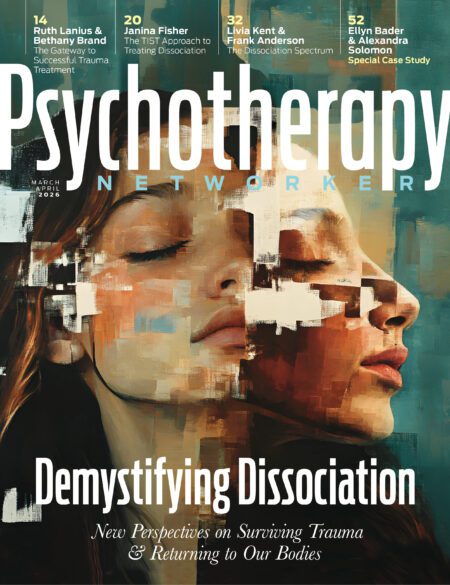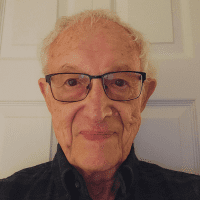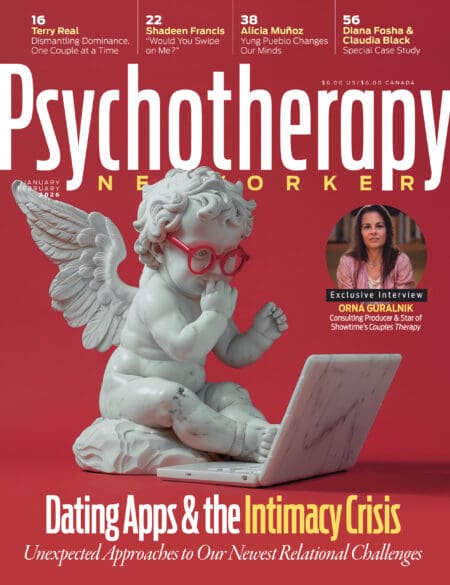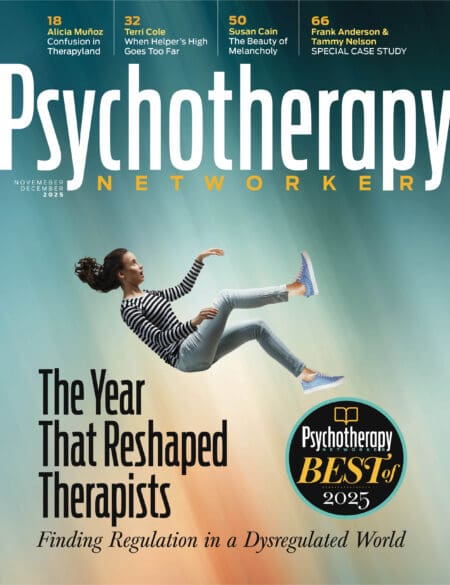Enjoy the audio preview version of this article—perfect for listening on the go.
Lately I’ve started to notice something about myself in social gatherings—even modest ones, where there are just six people around a table. Several conversations unfolding at once can leave me feeling oddly overwhelmed. Four people feels manageable. One or two is best. But large groups? When I can, I avoid them. For a long time, I assumed this was social anxiety. But it doesn’t quite feel like that. I’m not especially worried about what other people think of me or afraid of saying the wrong thing. The discomfort comes from somewhere else. It feels more like flooding. But it wasn’t always this intense. Five decades of practicing psychotherapy seem to have amplified it.
The feeling shows up in small, ordinary moments. I’ll be at a dinner with friends and notice I’m not really “at dinner” in the way they are. Instead, I’m monitoring tone and tempo, tracking the emotional subtext in the room. It’s not that I want to analyze, it’s that the information arrives uninvited, and lands in my body before I can decide what to do with it. I’ve even caught myself reacting this way in public places, like in waiting rooms and checkout lines. I’ll notice a tired face or a brittle voice or a subtle tightening of posture between two people, and feel a flicker of sympathy and concern. In crowded spaces, it’s even worse: it feels like dozens of emotional radio stations all broadcasting at the same time, and I find myself tracking them all. Again, not intentionally—it just happens.
Everywhere I turn, it seems there’s another emotional signal, another small drama to register. Everyone else seems relaxed, skimming along the surface of things, while I feel as if I’m absorbing the entire emotional weather of the room. After a while, it’s simply too much input. My system feels saturated. I start looking for a quieter corner, or for a single person to talk to—one nervous system at a time. The relief of narrowing my focus is immediate. And I sometimes wonder: Does anyone else experience this?
Maybe, on some level, I’ve always felt this way. But the feeling has grown stronger with time, which led me to a question I hadn’t considered before: What if this isn’t just temperament? What if it’s the work?
Medicine has long recognized that the work we do shapes our bodies. Housemaids develop swollen knees—housemaid’s knee. Writers develop cramped, unreliable hands—writer’s cramp. Computer workers develop numb fingers and burning wrists from carpal tunnel syndrome. Repeat demands lead to adaptation, and adaptation carries a cost. Our jobs leave marks on us. We accept this easily when the strain is physical. But when I recently sat down at yet another dinner table and immediately felt overwhelmed by the sheer volume of emotional information in the room, I began to wonder whether the same principle might apply to therapists. What if some occupations leave their imprint not on the knees or wrists, but on the emotions?
Psychotherapy demands something unusual. Most professions teach you to toughen up, to develop thicker skin and screen things out. But therapy asks the opposite. We’re trained to notice everything: subtle shifts in tone, things that aren’t being said, and feelings beneath and between the words. To do this, we lower our defenses. We open ourselves, deliberately, to other people’s inner worlds. Over time, we get very good at it. We turn up the volume and fine-tune. We become exquisitely sensitive instruments. It’s a professional strength. But what if that sensitivity has an occupational cost? What if the attunement that helps me detect a client’s barely perceptible sadness is the same attunement that leaves me overwhelmed at a dinner party? The knobs don’t seem to reset.
I’ve come to think of this as a kind of occupational emotional dysregulation, the emotional equivalent of writer’s cramp. Just as a writer’s hand can stiffen after years of repetitive motion, a therapist’s emotional boundaries can grow increasingly permeable after years of deliberate openness. Our injuries are quieter, but just as real: boundaries that don’t quite close off and emotional openness that doesn’t quite reset. The very capacities that make us effective in the consulting room can make us more vulnerable everywhere else.
Once I started looking for this, I began to notice its signs everywhere, in myself and in my colleagues. A thinner skin than we once had. Picking up subtle shifts in others’ feelings. Coming home from a day of sessions feeling oddly porous, as if the boundary between ourselves and others had softened. A colleague once said to me half-jokingly, “My spouse thinks I’m reading their mind. I’m not. I’m just picking up the tonal changes they don’t even know they’re making.” Another admitted that social gatherings had become work: “I can’t stop tracking who feels left out, who’s performing, who’s angry.” Many of us joke about “therapist conditioning,” the way we can’t stop analyzing or tracking emotional currents. But what if it’s not funny? What if, after years of opening ourselves to other people’s pain and longing, our emotional screening systems simply stay “on”? Early in our careers, it was easier to lean in and recover, to open the door and then close it again. We could go home and feel like ourselves. But I’ve found that after decades, the door doesn’t always latch. The volume stays turned up. The skill becomes the setting, and everyday life starts to feel louder.
There’s also something particular about the kind of attention psychotherapy requires. We don’t only listen for content. We listen for tone, rhythm, what’s being avoided, and what’s emerging. We track facial expressions, posture, and pauses. We notice when a client’s voice tightens, or the small shift from anger to shame. In the consulting room, this is part of the craft. But outside, the same sensitivity can become exhausting. A crowded room isn’t just a room. It’s an orchestra of emotional micro-signals, and if your instrument has been trained to hear them, you hear them.
Psychiatrist Ernest Hartmann described people as having “thick” or “thin” psychological boundaries. Those with thinner boundaries tend to be more permeable, more sensitive, and more easily immersed in others’ experience. It’s not surprising that many of these people are drawn to become therapists. Some may have had to develop their emotional “fine-tuning” to feel safe in the emotionally challenging environments of their childhood. Others are naturally drawn to the work because they can more easily relate to others. But the job may thin us further. What begins as a flexible professional stance—opening ourselves deliberately for a session—can gradually become a trait. We don’t just open when needed, we stay that way.
There’s a quiet relief in naming this. Because it’s easy to interpret our over-responsiveness as a personal flaw: being “oversensitive,” or being “burned out.” But it’s often something simpler and less judgmental. It’s occupational. Just as the runner’s knees wear down, the therapist’s boundaries grow more porous. This isn’t pathology, and it isn’t weakness. It’s just adaptation. And if this is true, then the remedy is something practical, and self-care isn’t just about vacations or exercise, but also emotional recovery: time without attuning, spaces where we’re not responsible for anyone else’s feelings, and moments when the volume knob can slowly turn back down.
For some therapists, the remedy may be more literal, like a quiet drive home with no phone calls, or a brief walk before entering the house. It’s a deliberate transition that says “work is over.” For others, it might mean protecting part of the week from having to relate, unstructured time where nothing is being asked of the nervous system.
Recovery also means realizing that it’s not our job to manage every emotional field we enter. As therapists, we often carry the responsibility for holding and containing. Outside therapy, that responsibility can become almost automatic. But intimacy and friendship don’t require the same stance. Sometimes the most restorative act is to simply let the room be the room.
Professional longevity isn’t just learning how to open deeply, but learning how to close again. Empathy, like any muscle, can be overused. Even the most finely tuned instrument needs to be put back in its case. So lately, when I find myself edging toward the quiet corner of a crowded room, I’m a little gentler with myself. I no longer assume something is wrong. I simply think, This is what decades of listening look like.
Michael Glenn
Michael L. Glenn, MD, is a retired family physician and psychotherapist who practiced in the Boston area for more than three decades. He is the author of Collaborative Health Care and, with Barry Dym, Couples: Exploring and Understanding the Cycles of Intimate Relationships.








